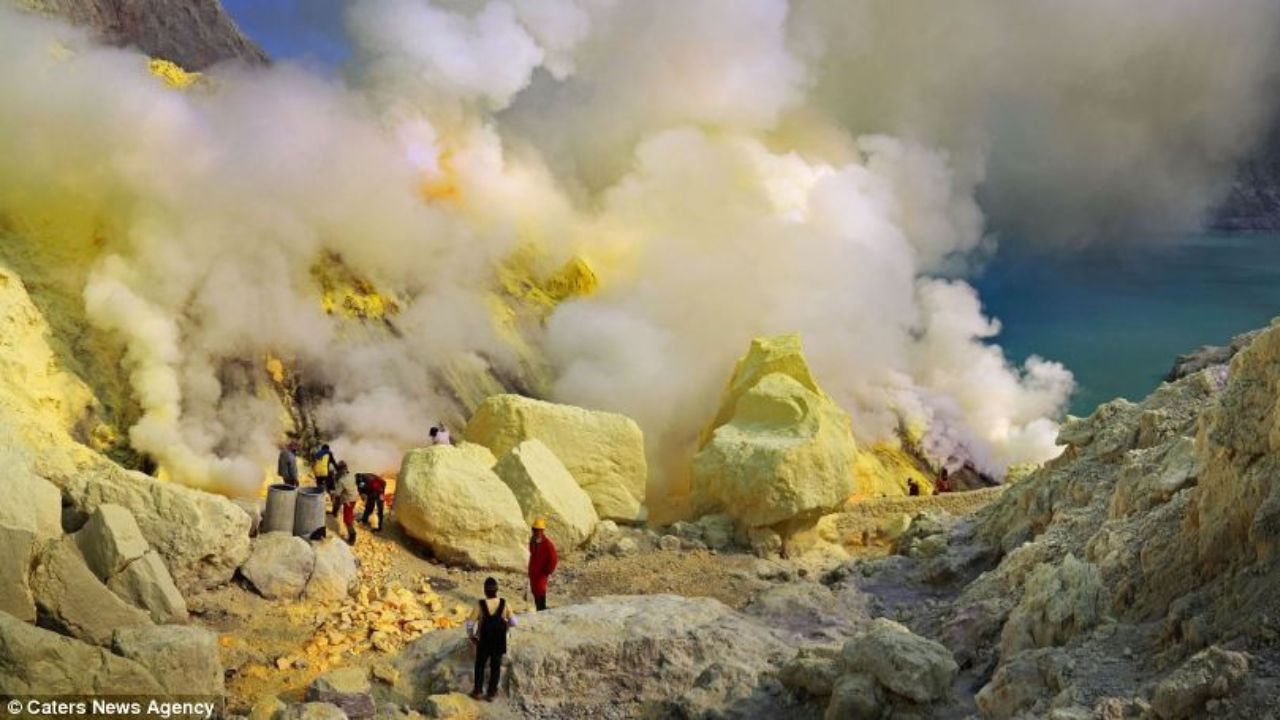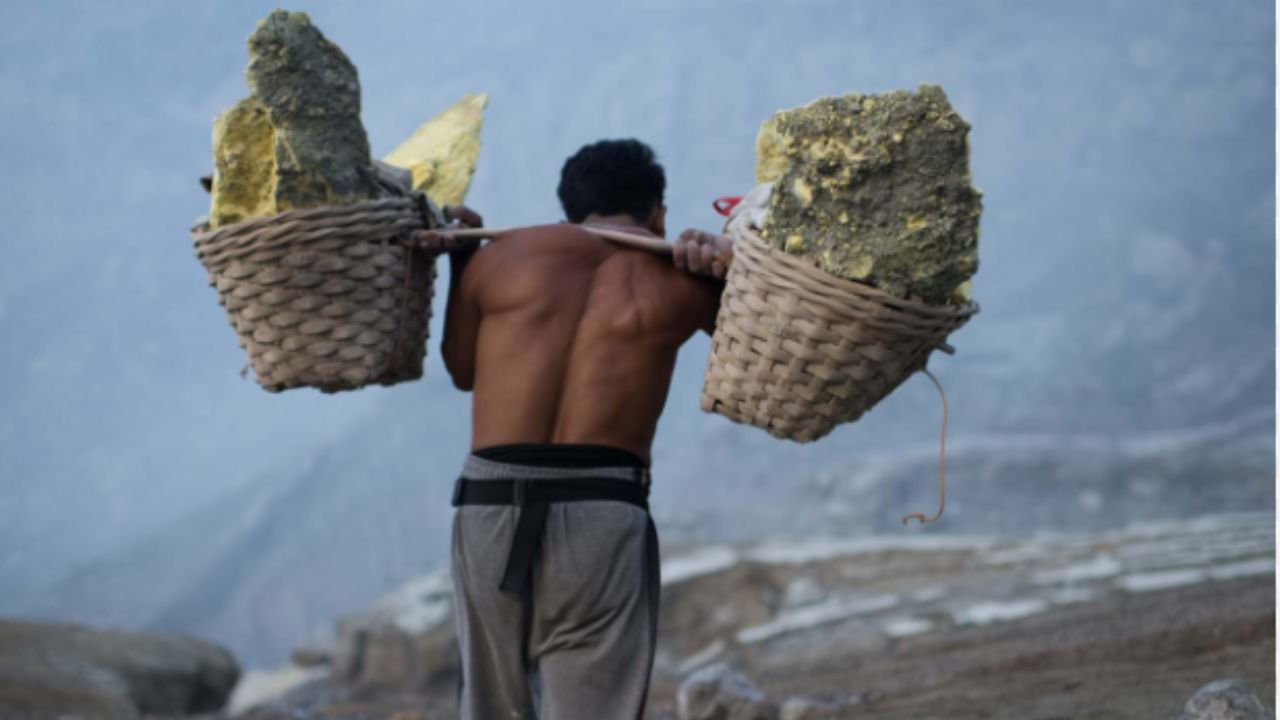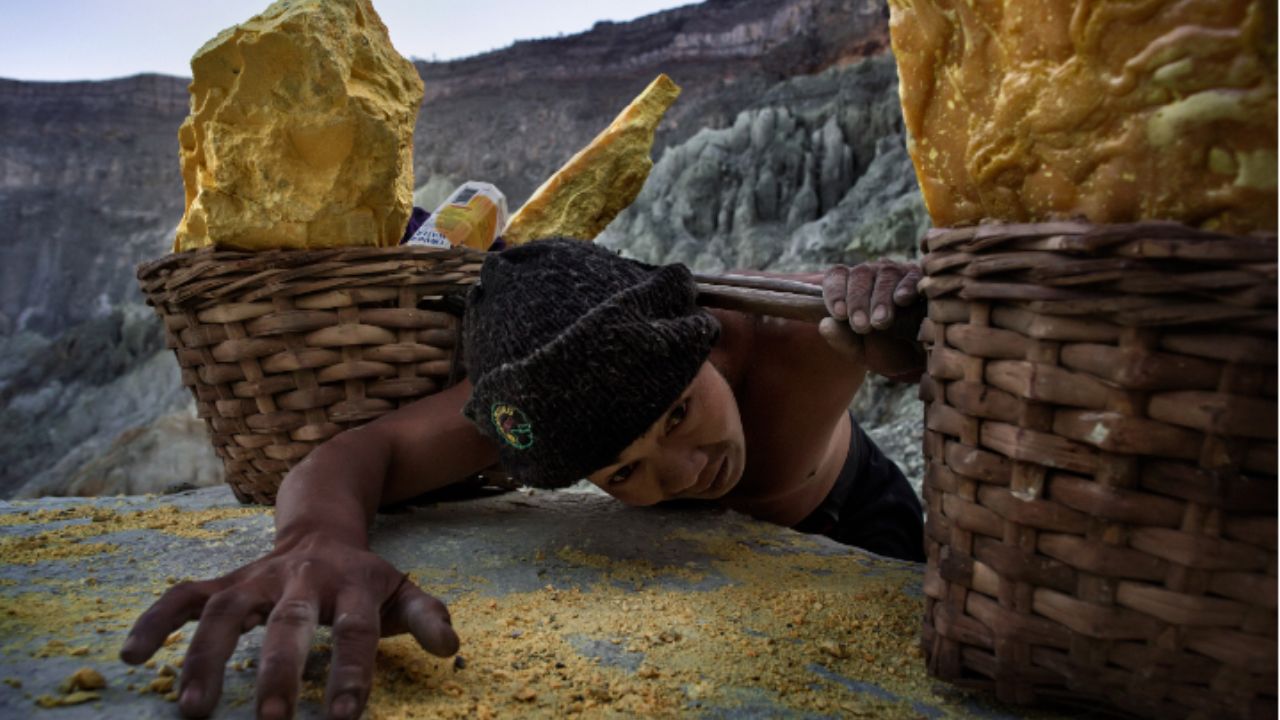Indonesia is home to some of the most active volcanoes in the world. With more than 150 active volcanoes, the country sits along the Ring of Fire, a region with a high concentration of seismic and volcanic activity. One such volcano is Kawah Ijen, located in East Java, Indonesia. This volcano has become famous for the sulfur miners who risk their lives to extract the valuable sulfur that lies deep within the volcano's crater.
Sulfur is a naturally occurring element that has been used for a variety of purposes throughout human history. It has been used in medicine, agriculture, and industry for centuries. However, sulfur mining is a dangerous and difficult job that requires a great deal of skill and courage. The sulfur miners who work at Kawah Ijen face extreme conditions every day, including toxic gas, intense heat, and unstable terrain.
So why do these miners continue to risk their lives to extract sulfur from Kawah Ijen and other active volcanoes in Indonesia? The answer lies in the value of the sulfur and the lack of economic opportunities in the region.
Sulfur is a valuable commodity that is used in a wide range of industries, including fertilizer production, chemical manufacturing, and the production of batteries. It is also used in the production of gunpowder and matches. Indonesia is one of the world's largest producers of sulfur, with much of the country's sulfur coming from Kawah Ijen and other active volcanoes.
Despite the value of sulfur, the miners who work at Kawah Ijen and other volcanoes in Indonesia earn very little for their work. Most of the miners are local villagers who have few other economic opportunities. They work long hours in difficult conditions for very little pay. Many of the miners are also uneducated and have few skills that would allow them to find other work.

For these miners, sulfur mining is a way of life. It is a way to provide for their families and to make a living in a region where economic opportunities are scarce. The miners are willing to take the risk of working in such dangerous conditions because they have few other options.
The work of the sulfur miners at Kawah Ijen and other volcanoes in Indonesia is incredibly dangerous. The miners must hike up the side of the volcano to reach the crater, which is filled with toxic gases that can be lethal if inhaled in large quantities. The miners wear gas masks to protect themselves, but the masks are often old and worn out, leaving the miners exposed to the toxic fumes.
Once the miners reach the crater, they use primitive tools to extract the sulfur from the ground. They break apart the hardened sulfur with metal poles and load it into baskets, which they carry on their shoulders back down the mountain. The baskets can weigh up to 200 pounds, and the miners often have to carry them over difficult terrain, including loose rocks and steep inclines.
The work is physically demanding, and the miners risk injury or even death every day. The unstable terrain can cause landslides, and the toxic gases can cause respiratory problems, including lung damage and death.
Despite the dangers, the sulfur miners continue to work at Kawah Ijen and other volcanoes in Indonesia. For many of them, sulfur mining is the only way to provide for their families. The work is hard, but it is also necessary.
There is no easy solution to the problem of sulfur mining in Indonesia. The miners need economic opportunities, but the region is remote and underdeveloped. The government has attempted to regulate the industry and provide safety equipment to the miners, but the regulations are often ignored, and the equipment is often substandard.
There have been calls for international organizations to help the sulfur miners in Indonesia, but so far, little has been done. The sulfur miners continue to risk their lives every day to extract sulfur from active volcanoes, and until there are better economic opportunities available, it is likely that they will continue to do so.
One of the reasons why sulfur mining in Indonesia is so dangerous is the lack of regulation and oversight. The government has attempted to regulate the industry, but the regulations are often ignored, and there is little enforcement. The miners are left to work in dangerous conditions with little protection, and accidents are common.
The lack of regulation has also led to environmental damage. The mining process releases toxic gases into the air, which can harm the local ecosystem and the health of nearby communities. The mining also disrupts the natural landscape, and the damage can take years to repair.
Another reason why sulfur mining continues in Indonesia is the lack of economic opportunities in the region. Many of the sulfur miners are local villagers who have few other options for work. The region is remote and underdeveloped, and there are few jobs available outside of agriculture and mining.
The Indonesian government has attempted to create economic opportunities in the region through tourism, but this has also led to problems. The increase in tourism has led to greater demand for sulfur mining, as tourists come to see the blue flames that are created when the sulfur is burned. The increase in mining has led to greater environmental damage and greater risk to the miners.

There have been efforts to improve the conditions for sulfur miners in Indonesia. The government has provided safety equipment and attempted to regulate the industry, but these efforts have been largely unsuccessful. International organizations have also called for action to improve the conditions for the miners, but so far, little has been done.
One organization that has been working to improve the conditions for sulfur miners in Indonesia is the Sulfur Miners Association. This organization was founded by a former sulfur miner who wanted to improve the conditions for his fellow workers. The organization provides safety equipment and training to miners and works to improve their economic opportunities.
The Sulfur Miners Association has also been working to promote sustainable tourism in the region. The organization works with local communities to promote tourism that is respectful of the environment and the local culture. This approach has been successful in creating economic opportunities without increasing the demand for sulfur mining.
In conclusion, sulfur mining in Indonesia is a dangerous and difficult job that is necessary for the production of sulfur, a valuable commodity used in a variety of industries. The sulfur miners who work at Kawah Ijen and other active volcanoes in Indonesia risk their lives every day to provide for their families in a region with few economic opportunities.
The lack of regulation and oversight has led to environmental damage and put the health and safety of the miners at risk. Efforts to regulate the industry and provide safety equipment have been largely unsuccessful, and there is a need for greater international cooperation to address the problem.
There is also a need for greater economic opportunities in the region. The Indonesian government and international organizations should work to create jobs and improve the economic conditions in the region to provide alternatives to sulfur mining.
Organizations like the Sulfur Miners Association provide hope for the future. By providing safety equipment and training to miners and promoting sustainable tourism, they are working to improve the conditions for sulfur miners in Indonesia. It is through efforts like these that we can ensure that sulfur mining is done in a safe and sustainable way that benefits both the miners and the local communities.






